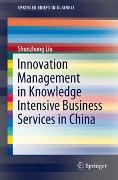Read more
In a knowledge-based economy, the development of a particular type of services, knowledge intensive business services (KIBS), becomes one of the characteristic trends in economic evolution.
Current research focuses mainly on service innovation in developed countries, but little consideration is given to the situation in developing countries.
Based on empirical research in the People's Republic of China, this book aims to contribute to a better appreciation and understanding of the innovative characteristics of KIBSs in developing countries.
List of contents
1. The Concepts and Characteristics of Knowledge Intensive Business Services.- Concept of Knowledge Intensive Business Services.- Typology of Knowledge Intensive Business Services.- Characteristic of Knowledge Intensive Business Service.- 2. Innovative Characteristics of Knowledge Intensive Business Services.- Theory of Service Innovation.- The Characteristic of Service Innovation.- Model of Service Innovation.- Method.- Sample.- Measures.- Analysis and Results.- Descriptive Statistics.- Statistical Analysis.- Discussion.- 3. New Service Development Performance.- Introduction.- A Literature Review on NSD Performance Dimension.- Conceptual Framework of NSD Performance.- Financial Performance.- Customer Performance.- Internal Process Performance.- Learning and Growth Performance.- Research Method.- Level of NSD Performance Measure.- Research Subject.- Item and Scale Construction.- Analyses.- Conclusion.- 4. Identifying Determinants of Top Performing New Service Development Activities.- Introduction.- Research Conceptualization.- Macro Level Dimensions.- Meso Level Dimensions.- Micro Level Variable.- Research Methods.- Pretests and Measures.- Sample and Procedure.- Performance Measure.- Identification of the Predictive Factors for Top Performing NSD Activities.- Finds.- Discussion.- Conclusion.- 5. Knowledge Intensive Service Activities in Chinese Software Industry.- The Innovative Source of Manufacturing Informationization.- Classification of Manufacturing Informationization Technologies.- The Relationship of Different Manufacturing Informationization Technologies.- The Characteristics of Manufacturing Informationization.- Conclusion.- Performance of software Industry in China.- The indictors Measuring the Inputs and Outputs of Software Industry.- The Theory of DEA.- Data Processing Method and Result.- Conclusion.- Reference.
Summary
In a knowledge-based economy, the development of a particular type of services, knowledge intensive business services (KIBS), becomes one of the characteristic trends in economic evolution.
Current research focuses mainly on service innovation in developed countries, but little consideration is given to the situation in developing countries.
Based on empirical research in the People’s Republic of China, this book aims to contribute to a better appreciation and understanding of the innovative characteristics of KIBSs in developing countries.

